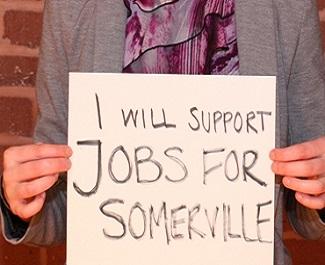
by SCC members Van Hardy, Laurie Goldman, Silvana Dinka, and Mary Jo Connolly

Natacha Theodore lives in Clarendon Hill and wants to work in Somerville. But with three young children and no childcare voucher, she can’t accept a full-time position.Instead, she has several part-time jobs outside of the City. She lives with the frustration of not being able to build a career or a stable future for her family.
When we talk about displacement in Somerville, most people think about affordable housing. But as escalating housing costs far outpace incremental wage increases, it’s obvious that access to a good job is as important to preventing displacement as access to stable housing.
Help Finding Good Jobs
Overall, Somerville’s unemployment rate is relatively low. But the highest rate of unemployment and underemployment is among immigrants as well as low-income residents of all races, several of whom are among the one in four Somerville households earning less than $35,000 annually. It is difficult for many of these residents to land even entry-level jobs because of skill gaps, language barriers, childcare needs, and complicated application processes.

For over a decade, the Somerville community has been advocating for adequate funding for a jobs program designed to connect local residents to the jobs promised by development. We know that new development brings new jobs. The problem is connecting local residents who are at risk of displacement to those job opportunities.
In the fall of 2007, community groups began to draw the City’s attention to these problems as new development began in Assembly Square. By 2011, a coalition led by Jobs for Somerville was proposing an ordinance requiring major employers to hire 30% of their workforce from the local community. Jobs for Somerville has also pressed for a jobs linkage fee to provide funding for job training, and fought to include local hiring and living wage jobs in a community benefits agreement in Union Square.
The local hiring ordinance was defeated by Mayor Joseph Curtatone’s veto threat. But one of the positive things to emerge from the campaign was the First Source Jobs Program, staffed by Somerville Community Corporation (SCC). In 2014, this initiative began working directly with job seekers who face barriers to employment, offering individual coaching and workshops to build their skills.
In 2012, Mayor Curtatone appointed the Somerville Jobs Advisory Committee (SJAC) to conduct an assessment of the workforce development system in Somerville. The SJAC recommended a “robust, sustainable workforce development funding system.” The committee recommended a jobs linkage fee and a line item in the City budget.
Supporting Workforce Development
This year, for the first time, the City’s budget includes a $160,000 line item for workforce development. For those of us in Jobs for Somerville who have been leading this work for 10 years, this seems like a positive step forward.
At the same time, we must ask if the City’s workforce development efforts will focus on the low-income residents, especially those who are immigrants and have limited English or other barriers to employment, which the SJAC identified.
We must also ask if the City’s workforce development program will prioritize programs to encourage Somerville businesses to hire and invest in local residents. Will this workforce development funding be used to train and support residents at risk of displacement from development in Union Square and elsewhere? Will it prioritize creating better quality jobs – jobs that pay a living wage, offer benefits and opportunities for union membership – than the many low-wage jobs that have been created at Assembly Square?
We need to prepare people for the jobs coming into the City and the region at the same time that we are designing the new workforce development system. We can’t afford to plan first – and do later.
Our neighbors in Cambridge allocate 0.5% of their annual city budget to helping people get access to jobs and job training. If Somerville did this, we would allocate $1 million annually, which could leverage additional grant funding from the state and/or private funders.
Some might argue that it doesn’t make sense for Somerville to do this, because we don’t have as many jobs as Cambridge. But our residents need immediate assistance to access jobs that allow them to support their families while they are acquiring the experience and skills to move ahead with their careers.
Forging a Better Future
Osny Cruz is one of those people. A resident of East Somerville, he worked a day job in landscaping and night job as a line cook in a restaurant. He liked the convenience of the neighborhood, but he came up short at the end of every month. In 2016 he moved to Chelsea, where his monthly income can cover the cost of a two-bedroom apartment for him and his family.
People like Natacha and Osny are not only workers; they are also parents. When they are displaced, their children lose the opportunity to benefit from our school system, and Somerville loses an important piece of its future. They also lose the protections of a sanctuary city that strives to protect its immigrant population.
We know the issues. The City of Somerville needs to allocate funding to programs that benefit those most at risk of displacement.
We will all benefit from an adequately funded plan that can be implemented immediately.
